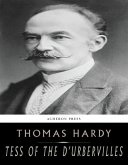"Tess of the d'Urbervilles: A Pure Woman" is a poignant exploration of the tragic life of Tess, a young woman ensnared by societal norms, fate, and class struggles in Victorian England. Hardy employs a naturalistic literary style, employing vivid imagery and symbolism to depict the harsh realities of rural life, as well as the constraints imposed upon women of the era. The novel embodies a critical commentary on the moral hypocrisy of society, demonstrating Hardy'Äôs belief in determinism and the often ruthless forces of nature that shape human destiny. Thomas Hardy, born in 1840 in Dorset, England, was deeply influenced by the rural landscape of his upbringing and the evolving social dynamics of his time. His own experiences and observations of the constraints of Victorian morality led him to sympathize with the plight of women, reflecting a progressive outlook that was rare for his time. Hardy'Äôs literary journey was characterized by his desire to challenge societal conventions and explore existential themes, as evident in the deeply affecting narrative of Tess. Readers seeking a profound and unflinching examination of love, responsibility, and the human condition will find "Tess of the d'Urbervilles" both captivating and unsettling. Hardy's masterful character development and evocative prose invite contemplation on the intersection of fate and free will, making this novel a timeless classic that resonates with contemporary audiences.
Dieser Download kann aus rechtlichen Gründen nur mit Rechnungsadresse in A, B, BG, CY, CZ, D, DK, EW, E, FIN, F, GR, H, IRL, I, LT, L, LR, M, NL, PL, P, R, S, SLO, SK ausgeliefert werden.









